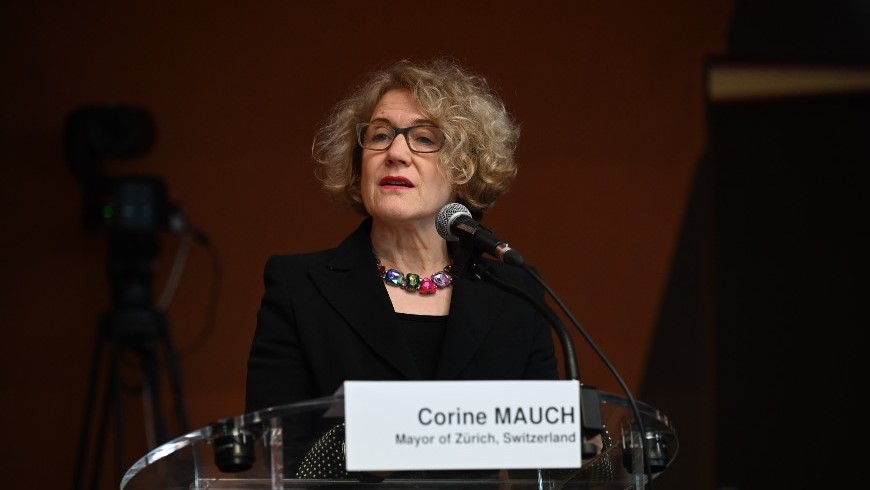Nobody doubts the reality of the environmental crisis and climate change anymore.
According to the Copernicus European observatory, 2024 started with the hottest January ever recorded. Towns and regions in Europe are being hit by natural disasters more and more frequently. Underlining the commitment of the Congress to promote “a fundamental right to the environment”, in particular by promoting the drafting an additional protocol to the European Charter of Local Self-Government, the President of the Chamber of Local Authorities, Bernd Voehrigner, also pointed out that the vital part played by local and regional authorities in protecting the environment had been recognised in May 2023 in the Reykjavik Declaration by Council of Europe Heads of State and Government.
Einar Þorsteinsson, Mayor of Reykjavik, demonstrated that preserving cultural and social traditions was not incompatible with reducing his city’s carbon footprint. Public thermal pools, which were so important to Icelanders, were now heated with green energy. Reykjavik had actually started developing geothermal energy in the 1930s and was now the city with the best geothermal urban heating system in the world. In his view, improving public health through the development of pedestrian and cycle routes which encouraged physical exercise was one of the best arguments for promoting the Green Deal among the public. It was also a key asset in the discussions aimed at drastically reducing the carbon emissions produced by cars, without, of course, forgetting the need to develop efficient and fast public transport services. His city had set the target of reducing CO₂ emissions by 50% by 2030 and a further 50% by the end of the following decade. This goal was being supported by the development of new technologies for capturing CO₂ from the atmosphere and storing it underground. Underling the ability of towns and cities to put pressure on central governments, in particular through transnational networks, the mayor of Reykjavik praised the role of the Congress and the Council of Europe in co-ordinating local and regional authorities’ efforts in environmental matters, notably through legal instruments to defend local self-government and fundamental human rights.
Zurich, which is often cited as one of the most sustainable cities in Europe, is also a pioneer in terms of environmental measures. Highlighting the Swiss government’s reluctance to pass strong legislation to combat pollution and global warming, in particular owing to the electoral unpopularity of some measures, Zurich Mayor Corine Mauch presented the ambitious policy of her city which, as far back as 2008, seven years before the Paris Agreements, had already taken steps which had enabled it to reduce its greenhouse gas emissions by 35% by 2010. Unlike the Swiss parliament, in 2022 Zurich residents had voted in favour of the target of net zero emissions by 2040. Regular reports by the municipal council would keep track of the progress of the policy, which included transforming the collective heating system with aid for private individuals, encouraging the circular economy and development of pedestrian neighbourhoods with local shops and services, providing 130 km of cycle paths, various measures to combat food waste and promote “sustainable eating”, support for businesses and NGOs that were partners in the city’s green policies, etc. To fund these projects, Zurich had taken out a green loan and was also intending to reduce its energy bills. Its mayor was therefore optimistic and convinced that local authorities could use political levers at local level to become leaders in environmental change.
Lastly, the youth delegate from Cyprus, Liana Liu Ioannides, urged her elders to provide a legal basis for and make compulsory young people’s participation in environmental policies and the Green Deal in Europe: “Young people can play a leading role, which local, regional and national authorities are depriving themselves of by often ignoring our calls and proposals. We can help you to harmonise policies in the various member countries and also to win public support. Losing young people’s potential means losing their trust.” Speaking on behalf of all the Congress youth delegates, Liana Liu Ioannides said that adding an additional protocol on environmental protection to the Charter of Local Self-Government would not be enough unless compliance with the Charter and the involvement of young people in environmental decision-making were made compulsory.
Over 15 Chamber members put forward their points of view and proposals during the debate which followed the addresses. They highlighted the primary role played by local and regional elected representatives in tackling the climate emergency, and the importance of leveraging their skills and financial resources to this end. They also stressed the need to synchronise local authorities’ action through international bodies like the Congress, in particular if the aim was to identify the best solutions for shared problems such as rising sea levels in coastal areas, coastline retreat, and the need to remove concrete and tarmac to counter flooding and urban heatwaves, etc. The war in Ukraine was also mentioned as a factor in massive ecocide that demanded concerted European aid. Joining together and better co-ordinating the efforts of Europe’s towns, cities and local and regional authorities would also enable pressure to be put on national governments, whose environmental policies often lacked ambition. The debate confirmed the need for the Council of Europe to draw up a text committing member states to raising awareness among local elected representatives of their responsibility to opt for green local governance within the framework of their competences.
***




